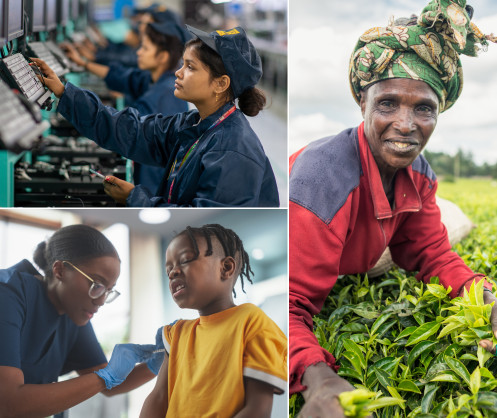Dalberg (www.Dalberg.com) is a strategic advisory firm that combines the best of private sector strategy skills and rigorous analytical capabilities with deep knowledge and networks across emerging and frontier markets. All projects include an option to integrate strategy design with implementation. With staff on the ground in more than 50 countries, speaking over 90 languages, and understanding diverse sectoral priorities and nuances, Dalberg is able to bring a local team to execute solutions tailored for the local market—while simultaneously drawing on global topical expertise and insight. Dalberg also offers the advantage of continuity. “The trusting relationships we build during the strategy phase carry through the inevitable pitfalls of execution,” points out Shruti Goyal, an Associate Partner with Dalberg. “We maintain senior project leadership from strategy through to execution and learning. This provides smooth transitions between phases of the project. Our ability to support clients in shaping their strategy is enhanced by bringing in the learning from implementation, particularly in addressing shifting client priorities, external disruptions, and opportunities.”
Since 2020, Dalberg has collaborated with governments, philanthropies, multilaterals, NGOs, and corporates to seamlessly integrate strategy and execution support for over 55 projects—including, recently:
Establishing the Malaria Vaccine Technical Assistance Program—in collaboration with Gavi, the Vaccine Alliance—to tackle head-on the challenges in vaccine deployment in Sub-Saharan Africa
Designing, testing, and scaling financial and non-financial solutions tailored to the unique needs and aspirations of rural women in Kenya.
Designing India’s first Skill Impact Bond (SIB)—an innovative approach to financing skilling and employment endeavors—and serving as performance manager to ensure the achievement of long-term career outcomes for young women.
Dalberg’s local presence also allows it to partner with grassroots organizations to drive implementation at the community level. “Our goal is systemic change,” says Goyal. “We hope to continue our deep partnerships from the start of the strategy journey through to execution to maximize the impact from our work.”
Below are two examples of how we have helped deliver complex assignments across multiple topics and geographies in Africa.
The Malaria Vaccine Technical Assistance Program – Lillian Kidane
Sub-Saharan Africa accounts for over 90% of malaria cases and related deaths globally and faces a host of challenges in vaccine deployment—from accessibility to integration with existing health systems. Earlier this year, Dalberg established the Malaria Vaccine Technical Assistance Program in collaboration with Gavi, the Vaccine Alliance. The initiative constitutes a comprehensive strategy to integrate the vaccine into national health systems, ensuring that the vaccine reaches the most vulnerable populations. Dalberg is working with multiple countries over the next three years to create tailored approaches to rolling out the new malaria vaccine. “We’re already seeing results,” says Lillian Kidane, Partner and Dalberg’s Regional Director for Africa. In Cameroon, for example, the successful launch of the malaria vaccine in 42 health districts has laid the groundwork for scaling up to the remaining 74 health districts. “The work also strengthens the case for promoting comprehensive healthcare delivery at the community level,” Kidane adds. Valuable insights from the program will facilitate the introduction of future vaccines, such as the human papillomavirus (HPV) vaccine.
Rural Women’s Agricultural Aspirations – Naoko Koyama
Dalberg is working with the World Bank, Amtech, and CGAP to design, test, and scale financial and non-financial solutions to meet the unique needs and aspirations of rural women in Kenya. Through the program, Dalberg aims to increase rural women’s use of financial and non-financial services, taking advantage of the national network of digitized and sustainable savings and credit cooperative organizations (SACCOs) as trusted community financial institutions, and strengthening access to markets through digitized farmer producer organizations (FPOs) and climate-smart agtechs and agribusinesses. The aim is to integrate services that include access to inputs, information, extension and capacity strengthening, and digital technology to enhance agricultural production. “Ultimately, we want to build more resilient agricultural livelihoods with increased access to financial services and markets, particularly for women,” says Naoko Koyama, a Dalberg Partner based in South Africa.
Looking forward
Dalberg sees a range of ways in which governments, philanthropies, multilaterals, NGOs, and private sector companies can accelerate their impact with implementation support, especially when they are taking on complex issues at the systems level. To learn more about our implementation work, please contact Shruti Goyal.
Contact: shruti.goyal@dalberg.com
Distributed by APO Group on behalf of Dalberg Advisors.

